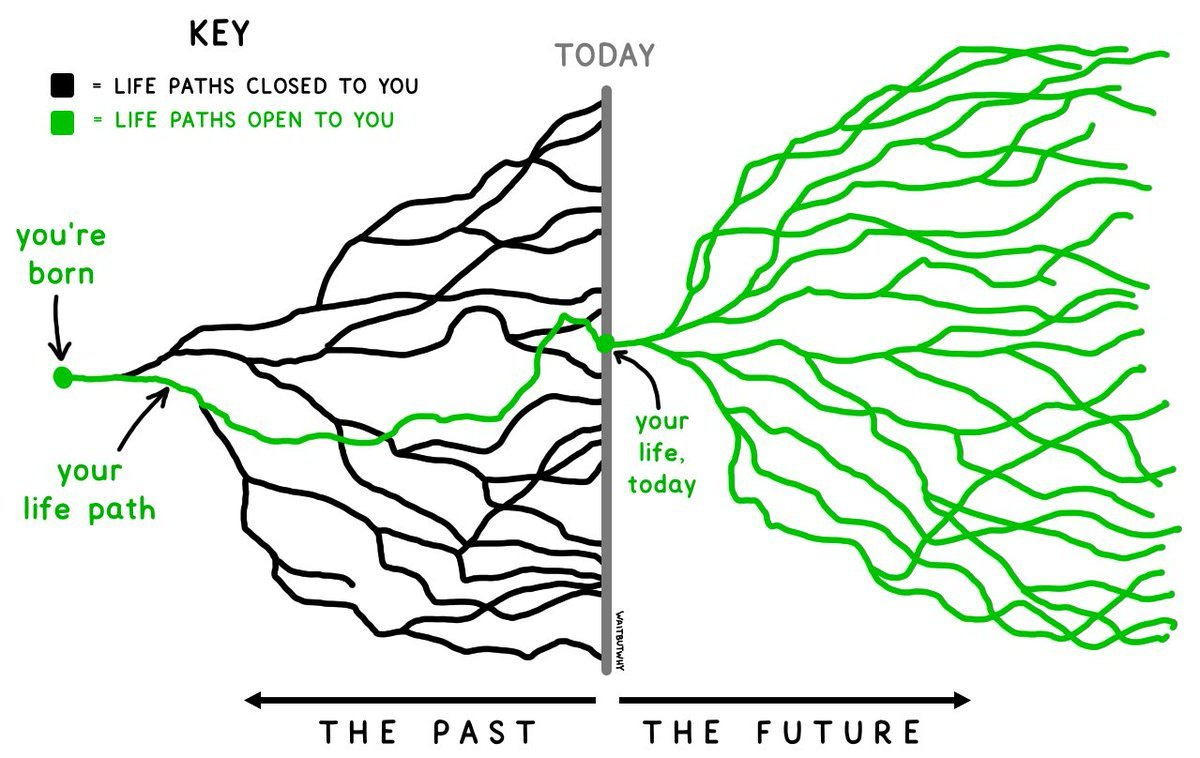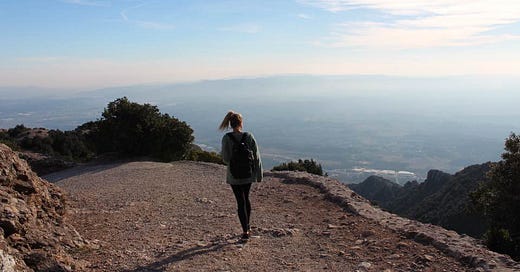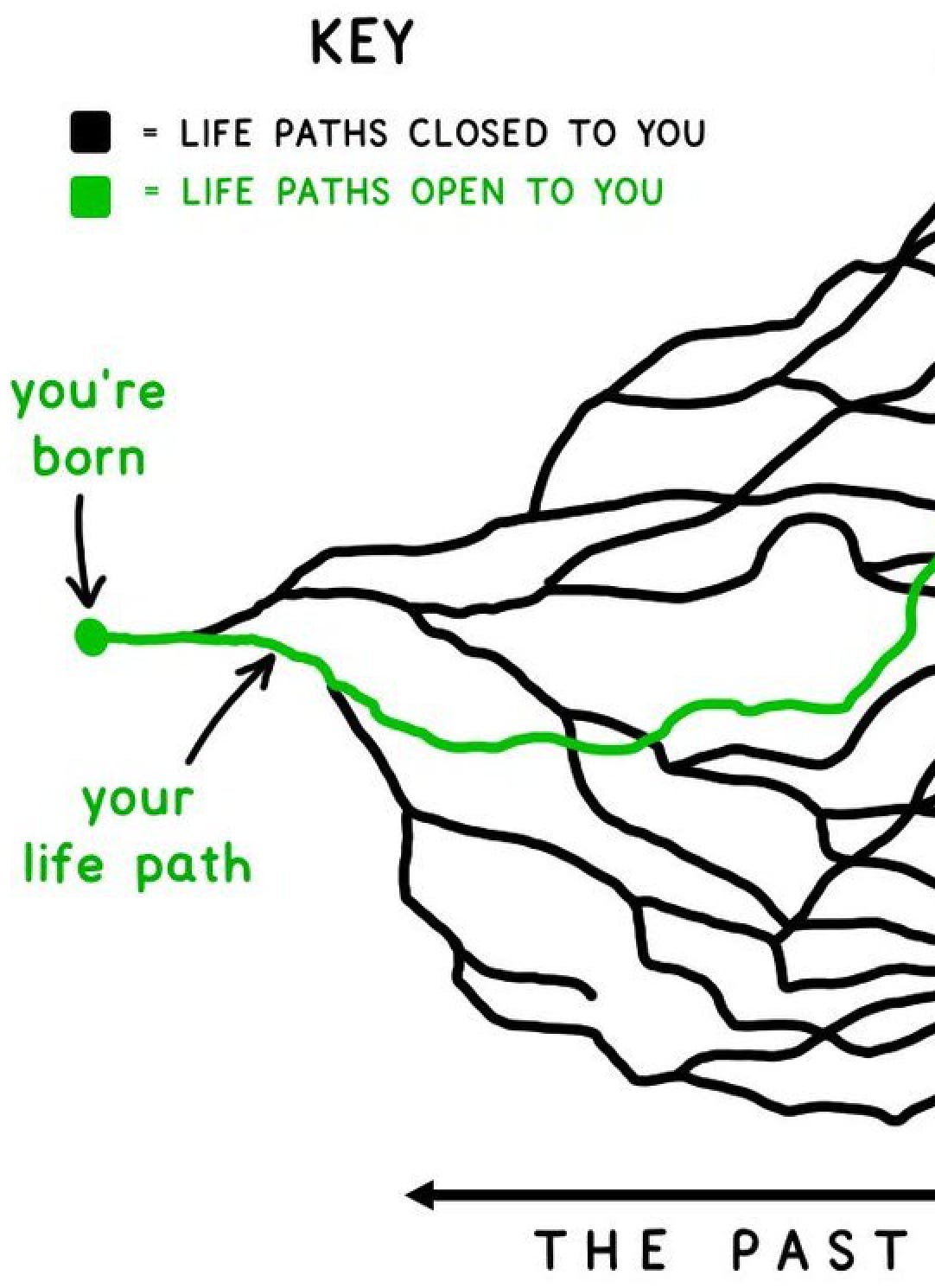I told my first boyfriend that if we ever thought about getting married, we should break up for six months before tying the knot.
It’d be a Hail Mary, a last chance to meet our soulmate before settling down with each other.
This wasn’t a particularly kind thing to say. Yes, I was nineteen.
But more than that, I was terrified of commitment.
To me, committing to one thing meant giving up one thousand potentially better things.
All around me, I heard this message: If you look a little bit harder, something better is out there.
Pick the job with the best exit options. Keep swiping on dating apps in case you find the perfect person, one swipe more than you thought you’d take. Keep scrolling, keep looking. Never settle, never commit.
At some point, I came across this visual. It shows how your past is set, but the potential options for your future are unlimited.

At the time, this brought me relief. I have one hundred million paths available to me from here on out. I have time. I have options.
What I didn’t know is this: Optionality is only helpful when you don’t know what you want.
If you know what you want, prioritizing optionality is just procrastination.
I found this out the hard way.
Three years into a job with great exit options, I looked up and realized I wasn’t anywhere near closer to the life I wanted to live.
All the years I spent following the playbook I picked up in college didn’t do me any favors. I had taken someone else’s definition of a “good life” and treated it like my own, only to realize all the assumptions had been wrong.
My life goal wasn’t to climb up a corporate ladder, work so much I couldn’t spend time with my family, and never leave New York City. Rather, my dream life is one where I’m able to spend time with my family, make friends in other countries, live in love, and write things that are meaningful to me.
With this clarity, I’m focused on building on my playbook.
When it comes to this illustration, I’m much more interested in the left side— the decisions already made.
What can I learn from my past choices so I can make better decisions going forward?
As I’ve started to reflect on the path so far, I see that my best decisions have come from intuition. My worst have come from silencing my internal voice to follow some conventional wisdom or another person’s advice.
I chose to work at the start-up I work at now solely on intuition.
Choosing this role was a big decision. I read countless articles about how to vet a good startup when job hunting. Go through lists of recent fundraising filings, make mental maps around the best markets, and build their financial models, the articles recommended.
But I went about it in the opposite way.
By then, I knew what I wanted because it was what I lacked. I wanted to feel differently and a big, prestigious organization wasn’t going to do that. What I really wanted was to work for a good person, have autonomy over my day-to-day life, learn a ton, and live in Spain.
I joined the first start-up I spoke to. The founder basically made me an offer in our first call. I had thought about “running a process,” doing a quantitative analysis and meeting all the other start-ups in the space to make sure this was the best one.
Instead, I committed.
I chose not to explore all the other possible paths because I figured if I had chosen wrong, I’d learn that quickly. In three months or so, I could go look for something that was more right. If I was right, I’d save a ton of time, energy, and bandwidth to keep investing in the path I was already on.
Moments like this have helped me see commitment as liberating, not limiting. Commitment gives information. I have shorter feedback loops. Once I make a choice, my body tells me: This is right. Or screeches: This is not right. Get me out of here!
Clarity comes from committing.
Learning from this, I no longer want to try to do everything halfway. I’m actively trying to reduce my options. When I remove the noise from my head and can listen to my intuition, I make my best decisions.
I’ve started to rest in knowing that there will be less roads to travel in the future. This is a good thing. When other paths become unviable, I’m able to double down on the bets I’ve made.
Too much optionality is distraction.
I’ve come to learn that switching costs and lack of focus are more expensive than the marginal benefit of switching. The real innovation comes from staying. From the quiet compounding of consistency.
For example, taking a long-term orientation in my relationship has been liberating.
When I used to take a short-term view, I’d act from ego. I’d hold the grudge, make the snarky comment, and prioritize what I wanted first. When I orient for the long-term, I’m eager to have the uncomfortable conversation, apologize quickly, and compromise.
Instead of keeping my eyes out for a partner who is 1% better (which I’m sure doesn’t exist), I’m able to spend 100% of my energy making this the best relationship I can.
With time, I’m finding that having less options is a relief.
When I lived in New York after college, I didn’t know who I was. I was young. Everything was new and I was moldable and malleable. I wanted to be liked by everyone– at work, in dating, when making new friends.
Now, when I travel back to New York, I’m astounded by how different it feels. I don’t feel so distracted and overwhelmed. I believe it’s because I’ve dramatically reduced the options that need my attention.
Who knew that getting older is actually amazing?
I’m in my dream relationship, so I don’t think about dating. I’m happy in my job. I’m clear on who my friends are.
I don’t need to go to a million events or try to win people over. I have peace in knowing who I am and who I want to be around. My social circle is the smallest it’s ever been, but I’m relieved by this. I’m aware of how I’m going to feel if I spend my time around a certain type of person, if I do a certain kind of thing.
More than that, I’m starting to recognize patterns. The older we get, the more data points we have. I take comfort in knowing that every time I was sure the world was ending, it didn’t.
All the heartbreaks and bad bosses, disappointments and ended friendships, that I viewed as catastrophic, I now see as catalytic. I’m grateful for the doors that closed.
I see it happening for my friends too.
Every person who got laid off gets a better job. The person who got dumped eventually finds the person they were meant to meet. We look back at what we thought we couldn’t live without and say that wasn’t for me.
As doors close, instead of being regretful, I’m relieved. If the journey is the destination, I’m glad there are less roads to choose from. This way, I can focus on where I am, without distraction, comparison, or regret.
It’s paradoxical. Commitment is liberation.
When I reduced my options, my life opened up for me.







I love this! I often think about how optionality is the real life exhausting factor. I sometimes wish I could just commit to my decisions.
One thing I may not agree with though. As I have been in the never ending hopeless haunt for a meaningful job -aka food journalism full time and not freelancing, I have gotten rejections by every single job I truly wanted (not many and I have done many many many interviews). As I keep seeing this happening (for years now, and specially this last year of unemployment where I truly decided to only apply to jobs I would enjoy) I can see doors keep on being closed. Rejection has never been so strong. And I keep asking myself « is it really because something better is waiting? And where? » because I see myself ending jobless and doing something I hate because im.... out of options.
What is your opinion on this Sarah? Would love to hear :)
Absolutely love this- just beautiful!!💕